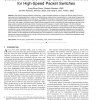Free Online Productivity Tools
i2Speak
i2Symbol
i2OCR
iTex2Img
iWeb2Print
iWeb2Shot
i2Type
iPdf2Split
iPdf2Merge
i2Bopomofo
i2Arabic
i2Style
i2Image
i2PDF
iLatex2Rtf
Sci2ools
160
click to vote
RTAS
1997
IEEE
1997
IEEE
Scalable Hardware Priority Queue Architectures for High-Speed Packet Switches
ÐWith effective packet-scheduling mechanisms, modern integrated networks can support the diverse quality-of-service requirements of emerging applications. However, arbitrating between a large number of small packets on a high-speed link requires an efficient hardware implementation of a priority queue. To highlight the challenges of building scalable priority queue architectures, this paper includes a detailed comparison of four existing approaches: a binary tree of comparators, priority encoder with multiple first-infirst-out lists, shift register, and systolic array. Based on these comparison results, we propose two new architectures that scale to the large number of packets (N) and large number of priority levels (P) necessary in modern switch designs. The first architecture combines the faster clock speed of a systolic array with the lower memory requirements of a shift register, resulting in a hybrid design; a tunable parameter allows switch designers to carefully balance the tra...
Related Content
| Added | 06 Aug 2010 |
| Updated | 06 Aug 2010 |
| Type | Conference |
| Year | 1997 |
| Where | RTAS |
| Authors | Sung-Whan Moon, Kang G. Shin, Jennifer Rexford |
Comments (0)

